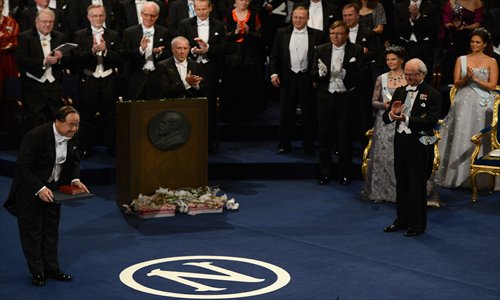Eye of the literary storm

For many Chinese citizens who have yearned for international recognition of China's literary talent, Mo Yan's acceptance of the 2012 Nobel Prize for Literature was a proud moment.
He received the award, which included the Nobel diploma, a medal and a certificate confirming the receipt of the 8 million Swedish Kronor ($1.2 million) award, from King Carl Gustaf XVI of Sweden Monday local time at the Stockholm Concert Hall.
However, the award has not been without controversy. As Mo accepted the award, he hailed the bravery of the Nobel Committee, for "sticking to their convictions" despite him being at the center of an international debate over the role of literature.
In China, the news has been met with joy and exuberance, though in some cases, others have sought to cash in on his fame.
The reaction in China
Gao Xingjian, who became a French citizen in 1987, won the prize in 2000, meaning that Mo's victory represents the first time a Chinese national has won the literary award, and the second time a Chinese-born writer has been honored.
Mo said at the ceremony that receiving the prize "feels like a fairy tale, but of course it is true."
In China, media figures and literary greats lined up to share their praise.
Liu Shabai, vice chairman of the Hunan TV and Broadcast Intermediary Corporation, hailed the event as "a historic moment for Chinese literature."
Mo's award helps fill in the blank spot surrounding Chinese literature in global literary history, said Huang Jiren, honorary president of the Chongqing Municipality branch of the China Writers Association.
His success has also prompted Chinese contemporary literary circles to rediscover, rethink and reconsider their understanding of the Nobel laureate, and to fully appreciate the meaning of his work, as his talent has long been underestimated, said Chinese poet Wang Jiuxin.
This is an opportunity for the writer to influence both authors and the public with his books, Wang said in a blog post, adding that "the Nobel Committee is looking at China and opening its arms to embrace the country's talents. It is also rectifying its previous prejudices toward, and misunderstandings of, the East."
Bai Ye, president of the Chinese Association of Contemporary Literature, said that Mo's victory presents an opportunity for Chinese writers to attract attention worldwide. "More excellent writers will be presented on the world stage," he said.
Zhang Yiwu, a culture critic and professor at Peking University, told the Global Times earlier that it was a historic breakthrough, indicating the Nobel Academy's affirmative attitude toward China and Chinese culture.
Zhang also said Mo's works are undoubtedly brilliant, but he also stressed that the Nobel Prize should not be the only gauge of the quality of a writer's work.
He noted that in addition to Mo, China has many excellent writers, such as Jia Pingwa and Liu Zhenyun, and writers should explore their own distinct styles to attract domestic and foreign readers.
A rough road to victory
In response to criticism from abroad that Mo's victory condoned censorship, the author pointed out that censorship is like "security checks at airports," according to the Associated Press.
"When I was taking my flight, going through the customs ... they also wanted to check me, even taking off my belt and shoes," he said. "But I think these checks are necessary."
He added that censorship shouldn't stand in the way of truth, but issues like defamation and online rumors required censorship. "I also hope that censorship, per se, should have the highest principle," he also said at the award ceremony.
Cashing in
In one recent high-profile incident, authorities in Mo's hometown of Gaomi, Shandong Province, announced plans of 670 million yuan ($107 million) to construct tourist sites dedicated to the literary figure.
The Beijing News reported that the plans would include a 666-hectare plantation of red sorghum, in recognition of Red Sorghum, Mo's 1987 novel, which was adapted into a film of the same name.
The South China Morning Post reported that local authorities were determined to set aside 500,000 yuan to renovate Mo's old home, despite the fact that the author had called the project "a waste of money."
The award ceremony also set off a rush in purchases of Mo's works in China.
According to dangdang.com, the country's leading online book retailer, Frog, one of Mo's latest works that earned him China's most prestigious award for novels - the Mao Dun Literature Prize - has topped bestseller lists for the past 24 hours and the past 30 days.
Two versions of his novel Big Breasts and Wide Hips were released by different publishers, and both are holding steady on top 10 lists.
Even insurance companies are trying to relate their business to Mo's works. According to a posting on the Sina Weibo account of baoxian.com, insurers are giving their clients Mo's works as additional gifts as the year-end peak in renewals for car insurance approaches.
A copy of Sandalwood Penalty with Mo's signature is priced at 180,000 yuan on the online shopping platform taobao.com.
The Beijing-based Genuine and Profound Culture Development Company, one of several major copyright agent companies for Mo's books, has seen its influence expand and wealth accumulate.
In a previous Global Times report, Shi Xiang, the company's general manager, said Mo's prize win has greatly increased their sale of books and e-books, and calls for screen adaptations have also seen an increase.
The company was given rights to release some of Mo's books both domestically and abroad, and adapt them for the screen and online books after signing a copyright contract.
"The average sales volume has rocketed to 500,000 to 1 million copies for each of his books after the winning of prize from 200,000 copies," Shi told the Global Times earlier.
Xinhua - Global Times